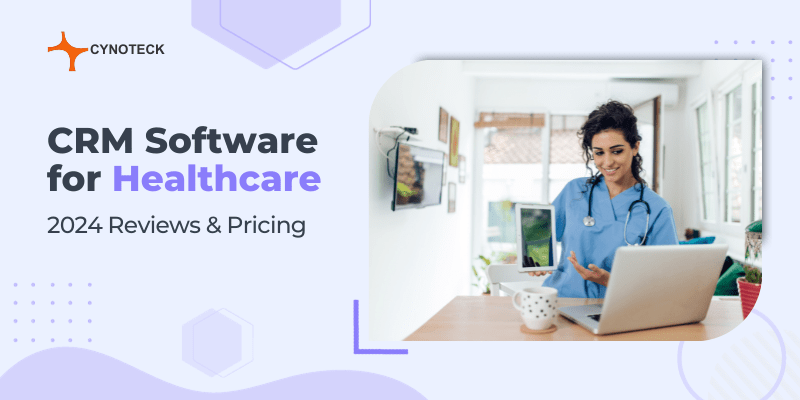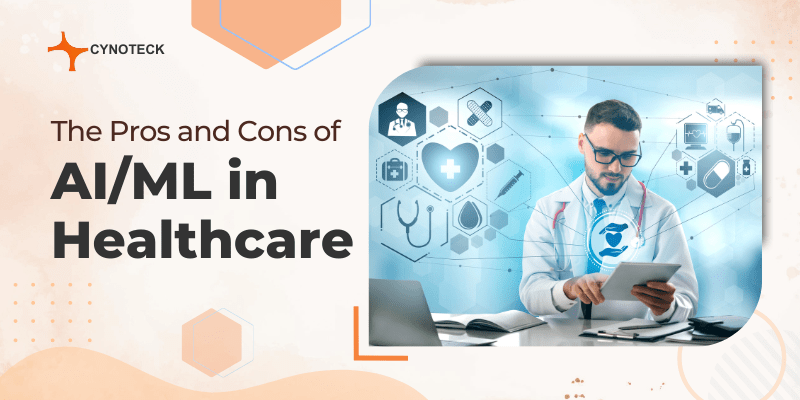Healthcare providers are constantly trying to improve patient experience, streamline their operations, and provide better patient care. Today, they are using patient-centered care approach to focus on the patient and provide better treatment. Patients these days have access to plenty of health information and use digital devices to stay informed. But they still rely on their healthcare providers for advice. Patients need to interact well with their doctors and nurses to take an active role in managing their health. Without this partnership, they can have difficulty in managing their health effectively.
To achieve better patient care, these healthcare organizations are adopting a concept commonly used in other business sectors—Customer Relationship Management (CRM). In healthcare, CRM can play a significant role in strengthening the connection between providers and patients. It helps healthcare staff deliver the best care by making processes simpler and more transparent. The primary goal of the healthcare CRM is to improve the entire patient experience, from the first visit to ongoing care, and ultimately, to improve health outcomes and save lives.
In this blog, we will explore more about the role of CRM in healthcare, its importance as an CRM system in healthcare, etc. We will look at how it can provide better patient care and optimize operations.
Understanding the Significance of Patient-Centered Care
Diagnosing issues and providing treatment aren’t the only things healthcare organizations focus on anymore. Today’s patients are well-informed and expect the type of care that meets their unique needs. With this in mind, healthcare organizations are now focusing on patient-centered care.
The patient-centered approach puts the patient’s needs, preferences, and overall well-being first. In this model, patients are seen as active partners in their treatment, which leads to more comprehensive and effective care. It also considers their mental, emotional, and social health, along with their physical condition. This ensures that they receive the best possible support and care.
Also Read: Enhancing Patient Care: Top 10 Strategies for Life Sciences Companies
CRM in Healthcare – Key Benefits
A healthcare CRM system helps hospitals, clinics, and other healthcare organizations build stronger relationships with their patients. It uses strategies and tools to manage and track patient interactions throughout their care journey.
With a healthcare CRM, all patient information is stored in one place, providing you with a full view of each patient’s details, like their age, medical history, social background, finances, and contact information. Using a healthcare CRM, you can treat patients like valued customers plus there are many other benefits that are outlined below:

1) Timely Access to Up-to-Date Patient Records
Doctors, nurses, and paramedical staff no longer have to spend valuable time searching for patient records or verifying medical history. With a CRM system in place, all patient information—like test results, treatment plans, and medical history—is stored in one place. This makes it easy for healthcare providers to access what they need and when they need. This makes everything more efficient and ensures that the latest patient information is always easily available to the right healthcare staff. As a result, patients can get quicker and better care when they need it most.
2) Streamlined Appointment Management to Reduce No-Shows
Patients appreciate the ease of scheduling their appointments online. Missed appointments can cause disruptions in care, throw off treatment plans, and delay overall health progress. A healthcare CRM helps by sending automated reminders, ensuring patients stay on track with their appointments and receive timely care.
3) Better Care Coordination
CRM systems in healthcare help different specialists work together more effectively. When healthcare professionals share information, everyone involved in a patient’s care stays updated on their treatment plan. Automated reminders for appointments, follow-up messages, and post-discharge instructions, along with 24/7 support from chatbots, encourage patients to take charge of their health. When patients are actively engaged in their care, it leads to better clinical outcomes.
4) Inquiry Handling with Intelligent Segmentation
To truly connect with your patients, you need to engage with them effectively. A CRM system allows you to manage appointment requests and inquiries based on the patient condition, location, previous diagnoses, preference, doctors, specific health issues, and even language. This makes it easy to match patients with the right doctor right away. This is one of the greatest benefits of the CRM system in healthcare.
5) Saved Time and Resources
Using CRM automation can save your team countless hours each day. With a healthcare CRM, your team won’t have to jump between different platforms to record information. Over time, these small-time savings can add up to several hours saved each month. Instead of bogging down your HR manager with tasks like tracking sick days, managing payroll, and organizing vacation schedules, now, you can automate these processes. This not only makes everything run more smoothly but also gives your team more time to concentrate on what truly matters: delivering excellent care to your patients.
6) Improved Data Reporting and Predictive Analytics
By utilizing a CRM system, healthcare providers can analyze data more intelligently, resulting in better patient outcomes and smarter decisions. Through this, they can gather all their data in one place, create customized reports, and utilize advanced analytics. Healthcare organizations can further use these capabilities to identify trends and insights, evaluate performance, and make well-informed decisions, ultimately leading to improved patient care.
7) Automated System for Patient Experience Feedback
Getting feedback and input is essential for improving medical services. By automatically asking patients for their input following their appointment, a CRM system helps expedite this process. This allows you to understand patient’s opinions about the hospital, the medical staff, and the care they experienced. It’s an easy way to measure patient satisfaction and make improvements where needed. You can also follow up with patients who might not have had a positive experience, providing you with a chance to address their concerns and improve. Automating this through text or email makes it simple for patients to provide their feedback quickly and easily.
8) Minimized Medical Errors and Optimized Billing Efficiency
CRM systems help cut down on mistakes that can happen due to unclear handwriting, miscommunication, or incomplete medical histories. This can be done by centralizing patient records and automating documentation and medication management. This not only streamlines the assessment, diagnosis, and treatment processes but also allows doctors and staff to quickly access patient information without searching or filtering through paper records. Additionally, these systems can also gather billing information from different healthcare departments, such as diagnostics, pharmacy, housekeeping, and cafeteria, automatically generating accurate bills and reducing the likelihood of human errors.
9) Smooth Integration with Existing Platforms
To unlock the full potential of CRM in healthcare, it must integrate smoothly with existing electronic health record (EHR) systems and other healthcare software. A unified CRM platform provides medical staff easy access to complete patient information, helping them work more efficiently and collaborate better across departments. When EHR is integrated with CRM, healthcare providers can make quicker diagnoses and treatment decisions. They can access real-time insights for better choices and bring together all patient data. This approach not only improves communication but also enhances the overall planning of treatments and care.
10) Providing a Hassle-Free Healthcare Experience to Delight Patients
You need to have access to the patient’s complete medical history when you schedule an appointment with them. The doctor can use this information to inform future prescriptions by learning about the patient’s past doctors, past treatments, medication history, and family medical background. Using a healthcare CRM system, doctors have all this information readily available at any time, making sure that they can make changes to medications or increase or decrease dosages as and when required.
Also Read: Cloud Computing in Healthcare: How It is Used and 11 Examples
How can Cynoteck help healthcare organizations?
Insufficient data can really hold healthcare organizations back from connecting well with their patients. That’s where a good CRM system can make a difference. At Cynoteck, we help healthcare providers create great experiences for their patients using Salesforce (Salesforce Health Cloud) as our primary CRM tool. This platform facilitates improved relationships between organizations and patients.
Healthcare professionals can track patient interactions and gather feedback by using consumer data. This allows them to adjust their care to better suit each patient’s individual needs. When patients feel this level of personal attention, they often feel more appreciated and are happier with their overall care and treatment.
Quick Takeaways:
- Patient-centric care management is becoming more effective with the help of healthcare CRM software.
- A Healthcare CRM empowers providers with the ability to create customized care plans for different patients as per their requirements.
- CRM systems make updated patient health information easily accessible when required.
- The benefits of healthcare CRM include operational, teamwork, and analytical improvements.
Also Read: Best CRM Software for Healthcare – 2024 Reviews & Pricing
Conclusion
As the healthcare sector is undergoing different advancements, using CRM systems can significantly improve patient care, improve satisfaction, and simplify and streamline daily business operations. CRM is changing how healthcare providers build and manage relationships with patients, helping them provide better patient care and engagement. By organizing data in one place, improving communication, collecting feedback, and ensuring smooth care coordination, these CRM systems can create a more patient-focused approach.
But before you get one for your business, it’s important to assess what your organization needs and what plan you have for future growth with CRM. If you’re thinking about implementing a CRM for your healthcare business, contact us today. We, at Cynoteck, can help you in the smooth adoption of a CRM system for your healthcare organization to help you improve patient care and organizational efficiency.
Also Read: Leveraging Salesforce Health Cloud for Patient Engagement and Improved Outcomes
FAQs (Frequently Asked Questions)
1) What are the key objectives of healthcare CRM software?
Enhancing patient-provider interactions and streamlining administrative processes are the primary objectives of a healthcare CRM. It improves relationships with stakeholders and patients, facilitating efficient coordination, individualized patient treatment, and more effective handling of administrative tasks. As a result of this, overall health outcomes and and patient satisfaction, both are improved.
2) What should you look for when choosing a CRM system for a healthcare organization?
Healthcare organizations should always choose a CRM system that integrates seamlessly with electronic health records (EHRs) and other software solutions that they are using. This helps provide quick access to comprehensive patient information and streamlines business operations. With this integration, healthcare providers can better engage with patients, improve how they work, and make data management easier. You also get access to features like appointment reminders, options for rescheduling, and automated scheduling, which can help provide better patient care and reduce the number of missed appointments.
3) What are the challenges in implementing healthcare CRM software?
When implemented properly, CRM systems can increase patient involvement and streamline processes for healthcare organizations. But this journey can be difficult and necessitates providing several things significant thoughts. Complying with healthcare regulations and understanding the demands of patients and healthcare professionals are only two of the many elements that make up the implementation process. Making sure that the data is secure, integration with existing systems, and promoting user acceptance are a few of the challenges that occur while implementing healthcare CRM software.
Salesforce Health Cloud Services
Revolutionize your healthcare organization with Salesforce Health Cloud. Connect with patients, track health data, and manage workflows seamlessly. Contact us now to learn how Health Cloud can improve patient care and streamline operations.





